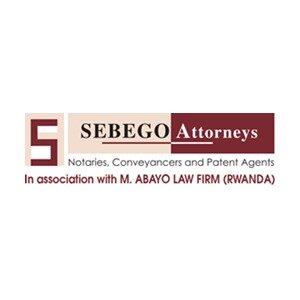Best Dependent Visa Lawyers in Botswana
Share your needs with us, get contacted by law firms.
Free. Takes 2 min.
Or refine your search by selecting a city:
List of the best lawyers in Botswana
About Dependent Visa Law in Botswana:
Dependent visas in Botswana allow family members of individuals who are legally residing in the country to join them and stay for a specified period. This visa category is designed to keep families together and support individuals who are working or studying in Botswana.
Why You May Need a Lawyer:
Seeking legal advice when applying for a dependent visa in Botswana can help ensure that the process goes smoothly and that all requirements are met. Lawyers can assist with paperwork, provide guidance on eligibility criteria, and represent individuals in case of any legal issues during the application process.
Local Laws Overview:
In Botswana, dependent visa applications are usually processed by the Department of Immigration. To qualify for a dependent visa, the applicant must prove their relationship to the primary visa holder, provide evidence of financial support, and meet other specific requirements set by the immigration authorities.
Frequently Asked Questions:
1. What is a dependent visa?
A dependent visa allows family members of individuals legally residing in Botswana to join them and live in the country for a specified period.
2. Who qualifies as a dependent in Botswana?
Dependents in Botswana typically include spouses, children, and sometimes other family members who rely on the primary visa holder for financial support.
3. What documents are required for a dependent visa application?
Required documents may include proof of relationship, proof of financial support, medical certificates, and a valid passport.
4. How long does it take to process a dependent visa application?
The processing time for dependent visas in Botswana can vary, but it usually takes a few weeks to a few months.
5. Can I work with a dependent visa in Botswana?
Dependents in Botswana are typically not allowed to work unless they apply for a separate work permit.
6. Can I study with a dependent visa in Botswana?
Dependents in Botswana can study, but they may need to obtain a student visa if they plan to enroll in an educational program.
7. Can dependents change their visa status in Botswana?
Dependents may be able to change their visa status in Botswana, but they should consult with immigration authorities or a lawyer for guidance on the process.
8. What are the common reasons for dependent visa application rejections?
Common reasons for dependent visa rejections in Botswana include incomplete documentation, lack of proof of relationship, and failure to meet financial requirements.
9. Can a dependent visa holder apply for permanent residency in Botswana?
Dependent visa holders may be able to apply for permanent residency in Botswana after meeting specific criteria, such as residing in the country for a certain period.
10. How can I appeal a dependent visa rejection in Botswana?
If your dependent visa application is rejected, you can appeal the decision by submitting additional documentation or requesting a review of the case. Consulting with a lawyer can help guide you through the appeals process.
Additional Resources:
For more information on dependent visas in Botswana, you can visit the Department of Immigration website or contact a local immigration lawyer for legal advice and assistance.
Next Steps:
If you need legal assistance with a dependent visa application in Botswana, consider reaching out to a knowledgeable immigration lawyer who can provide guidance and support throughout the process. They can help you understand the requirements, prepare the necessary documentation, and represent you in dealings with immigration authorities.
Lawzana helps you find the best lawyers and law firms in Botswana through a curated and pre-screened list of qualified legal professionals. Our platform offers rankings and detailed profiles of attorneys and law firms, allowing you to compare based on practice areas, including Dependent Visa, experience, and client feedback.
Each profile includes a description of the firm's areas of practice, client reviews, team members and partners, year of establishment, spoken languages, office locations, contact information, social media presence, and any published articles or resources. Most firms on our platform speak English and are experienced in both local and international legal matters.
Get a quote from top-rated law firms in Botswana — quickly, securely, and without unnecessary hassle.
Disclaimer:
The information provided on this page is for general informational purposes only and does not constitute legal advice. While we strive to ensure the accuracy and relevance of the content, legal information may change over time, and interpretations of the law can vary. You should always consult with a qualified legal professional for advice specific to your situation.
We disclaim all liability for actions taken or not taken based on the content of this page. If you believe any information is incorrect or outdated, please contact us, and we will review and update it where appropriate.
Browse dependent visa law firms by city in Botswana
Refine your search by selecting a city.








